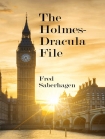The Dracula Tape, Fred Saberhagen [the dot read aloud TXT] 📗

- Author: Fred Saberhagen
Book online «The Dracula Tape, Fred Saberhagen [the dot read aloud TXT] 📗». Author Fred Saberhagen
The hammer fell from Arthur’s hand. He reeled and would have fallen had we not caught him.
The men now all perceived, in the face of the dead girl before them, the “unequaled sweetness and purity” that they remembered as having been Lucy’s during her breathing days. It has long been my observation that nothing so improves a human being’s character in the eyes of the world as death, final and irreversible. As when Lucy had “died” before, they marveled at her now un-threatening beauty, which Seward took as “earthly token and symbol of that calm that was to reign forever.”
This was to have been the day she married Arthur; and now that she was dead beyond a doubt. Van Helsing gave his blessing to such union as could reasonably be achieved between the couple: “And now, my child, you may kiss her. Kiss her dead lips if you will … for she is not a grinning devil now — not anymore a foul Thing for all eternity …”
Arthur gave her his kiss and left the tomb; whereupon the doctors “sawed off the top of the stake, leaving the point of it in the body. Then we cut off the head and filled the mouth with garlic …”
Cutting off the head with a metal blade, which is practicable once wood has shattered the vampire heart, serves to interrupt the nervous system, thus preventing the still-active brain from orchestrating a regeneration of damaged heart tissue, which would otherwise be quite possible. Another safety measure for the vampire hunter is to leave the point of the stake in place, at least until the vampire’s body as a whole has reached an advanced stage of decomposition. This requires a period of time which varies with the individual, and is usually longest for those who like Lucy have not been long in vampire life. The old, old nosteratu like myself may disintegrate, like Poe’s M. Valdemar, almost at once when we are staked.
As for the garlic stuffing, I can only guess that it is used in some confusion of this butchery with culinary art. Though I have never heard of any of the breathing actually trying to eat vampire flesh, I am sufficiently well acquainted with their other habits that I should not be too much surprised.
So, they took away such life as God had given Lucy, and I in my poor, well-meaning way had tried to help her to retain. When they were done they soldered up her mangled body in its coffin and then went outside and sealed the tomb, and looked about to find “the air was sweet, the sun shone, and the birds sang, and it seemed as if all nature were tuned to a different pitch. There was gladness and mirth and peace everywhere …” And Arthur bestowed on Van Helsing his profuse thanks.
One bat in the ointment remained, however, and the professor would not let the others leave the graveyard before he had them all formally enlisted in “a greater task: to find the author of all this our sorrow and to stamp him out … do we not promise to go on to the bitter end?”
Track Five
Of these events surrounding Lucy’s murder, as I say, I knew nothing at the time. When I left her alone with Van Helsing in the graveyard I considered that it was beyond my power to protect her further, and so turned all my thoughts toward the problem of my own survival.
Lucy had told me that one of her physicians was a Dr. Seward, director of an asylum in Purflect; and unless that whole neighborhood were given over to madhouses, I judged it likely that Seward was my own next-door neighbor as well as a consultant of Van Helsing. Then there was Harker, whose journal at least Van Helsing had somehow read; and Harker, who had arranged so much for me, knew that I was likely to be found at Carfax.
I did not know if Harker himself was back in England, or even if he was still alive, or sane. Nor did I know where in England Van Helsing might be staying. Dr. Seward was of course another matter, and I judged his asylum the best place to start in keeping an eye upon my enemies. It was a very old stone house — though not quite as ancient as Carfax — of many rooms, on two floors, much of the ground floor being given over to the rooms or cells for lunatics. The clientele came from the upper classes, and some of the best families of England were represented — Renfield himself was an example.
On the night of September twenty-ninth I ghosted in bat-form around this converted mansion, observing what I could wherever blinds were open. The first figure that I recognized was that of my erstwhile visitor Renfield, sitting placidly, with folded hands, in a ground-floor room whose window had been lately reinforced with heavy metal bars and fresh timbers. As I flew past I saw a sort of inner light come over the madman’s face, and he started up from his poor chair — that with a simple cot made the chief furnishing of his room — and began to approach the window; but I flapped on my way, not wishing to





Comments (0)